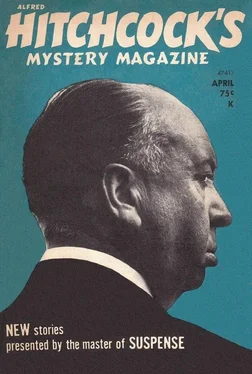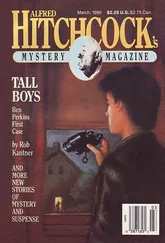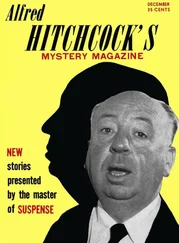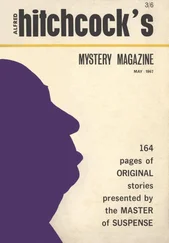Роберт Колби - Alfred Hitchcock’s Mystery Magazine. Vol. 17, No. 4, April 1972
Здесь есть возможность читать онлайн «Роберт Колби - Alfred Hitchcock’s Mystery Magazine. Vol. 17, No. 4, April 1972» весь текст электронной книги совершенно бесплатно (целиком полную версию без сокращений). В некоторых случаях можно слушать аудио, скачать через торрент в формате fb2 и присутствует краткое содержание. Город: Riviera Beach, FL, Год выпуска: 1972, Издательство: H.S.D. Publications, Жанр: Детектив, на английском языке. Описание произведения, (предисловие) а так же отзывы посетителей доступны на портале библиотеки ЛибКат.
- Название:Alfred Hitchcock’s Mystery Magazine. Vol. 17, No. 4, April 1972
- Автор:
- Издательство:H.S.D. Publications
- Жанр:
- Год:1972
- Город:Riviera Beach, FL
- ISBN:нет данных
- Рейтинг книги:5 / 5. Голосов: 1
-
Избранное:Добавить в избранное
- Отзывы:
-
Ваша оценка:
- 100
- 1
- 2
- 3
- 4
- 5
Alfred Hitchcock’s Mystery Magazine. Vol. 17, No. 4, April 1972: краткое содержание, описание и аннотация
Предлагаем к чтению аннотацию, описание, краткое содержание или предисловие (зависит от того, что написал сам автор книги «Alfred Hitchcock’s Mystery Magazine. Vol. 17, No. 4, April 1972»). Если вы не нашли необходимую информацию о книге — напишите в комментариях, мы постараемся отыскать её.
Alfred Hitchcock’s Mystery Magazine. Vol. 17, No. 4, April 1972 — читать онлайн бесплатно полную книгу (весь текст) целиком
Ниже представлен текст книги, разбитый по страницам. Система сохранения места последней прочитанной страницы, позволяет с удобством читать онлайн бесплатно книгу «Alfred Hitchcock’s Mystery Magazine. Vol. 17, No. 4, April 1972», без необходимости каждый раз заново искать на чём Вы остановились. Поставьте закладку, и сможете в любой момент перейти на страницу, на которой закончили чтение.
Интервал:
Закладка:
I waited.
“We have had three identical complaints against the Belmont Detective Agency in the last four years.”
“What were they about?”
“The complainants maintained that Mr. Belmont, who is the Belmont Detective Agency, approached them and informed them that he had been hired to investigate them. He then offered to give them a ‘clean bill of health,’ as he put it, if they would hand him two hundred dollars.”
“What was done about it?”
“Each time Mr. Belmont categorically denied making the offers, and since there was no proof of the offers other than the word of the complainants, we just put the items in our files and that is where they rest.”
“Did Belmont tell them why they were being investigated?”
“Yes. In two of the cases, husbands wanted their wives followed to see what they were up to. In the other case, it was just the reverse.”
I thanked him and hung up.
According to our accepted principles of justice, a man is innocent until proven guilty. However, I preferred to make an exception in this case.
I judged Belmont guilty and even multiplied his offenses by five, under the assumption that the complainants represented only a fraction of those approached by Belmont. The great majority had either refused to pay and did not bother to go to the Better Business Bureau, or had simply paid for their ‘clean bill of health.’
I further reasoned that when Ariana had gone to Belmont for a check on Randall Clay, Belmont had merely approached Clay with an offer to transmit a favorable report, and Clay had accepted.
It was hypothesis, of course, but confident hypothesis.
I reached for the phone and got the long-distance operator. “I’d like to make a call to a Mr. Randall Clay at the Oakland Hotel in St. Paul. I’m sorry, but I can’t find his number at the moment.”
After a while, a man answered. “Hello?”
“Are you Randall Clay?”
“Yes.”
“I am a former employee of the Belmont Detective Agency,” I said.
There was caution in his voice. “Yes?”
“I have acquired some interesting information concerning your past.”
His voice was cold. “My past? I’ve already made suitable arrangements with Mr. Belmont on that matter.”
I laughed significantly. “But you haven’t made any arrangements with me, and, as I said, I am a former employee of the Belmont Detective Agency.”
“Just what is this ‘information’ which you claim to possess?”
“Oh, come now, Mr. Clay. You don’t expect me to repeat it over the phone? Suffice it to say that if I relay it to the proper people, it could change the rest of your life considerably. Very considerably.”
“What the devil do you want? Money?”
“Perhaps. But mostly I want to meet you. You have time to catch the evening train or take a plane and be here by morning. At exactly twelve noon I want you standing on the northeast corner of Sixth and Vermont. You will remain standing there until I approach you, which will be within the hour.”
“Of all the ridiculous...” He paused. “Where are you calling from?”
I gave him the city, but not the number.
“Why do we need to meet in such a public place?”
“I am a cautious man, Mr. Clay.”
I suddenly realized that I hadn’t the faintest idea of what Randall Clay looked like. “You will wear a white carnation in your lapel,” I said, “and carry a cane.”
“I don’t have a cane.”
“Then get one. It doesn’t have to be expensive. An ordinary rattan will do.” I hung up.
Well, that was that. Either he’d show up tomorrow or he wouldn’t.
I picked Ariana up at seven. We had dinner and then took in the play. During the Rathskeller scene in the third act, the audience was invited to take off its clothes. Seventeen women and one scrawny young man did.
When I took Ariana back to her hotel, we said good night at the elevators.
At eleven-thirty the next morning, I was in the coffee shop of my office building watching the northeast corner of Sixth and Vermont.
At five to twelve, a tall man, graying at the temples, appeared at the corner. He wore a white carnation in his lapel and he carried a cane.
He waited.
At five after twelve, I went to the public phone booth. I looked up the number and dialed Police Headquarters. I asked to be switched to someone on the Bomb Squad.
A voice identified itself as Sergeant Moody.
“Do you have a pencil and paper?” I asked.
“I always have a pencil and paper.”
“Then take down this name. Randall Clay.”
“So?”
“So he is now standing on the northeast corner of Sixth and Vermont. He has a carnation in his lapel and he is carrying a rattan walking stick.”
“What am I supposed to do about that?”
“He can tell you a great deal about the bombings at the university last month. A great deal.”
“Who is this calling?” he demanded.
“Let us say that I am a concerned citizen.” I hung up.
I found my hands slightly damp and wiped them with a handkerchief. I suppose I could have said that Clay was wanted for theft or rape, but bombing seems to be the in thing nowadays and I thought that it would get the immediate and undivided attention of the police. They would probably hold him long enough for a thorough investigation into his past.
I went back to the coffee shop and waited.
Six minutes later an unmarked car containing two men pulled up at the northeast corner of Sixth and Vermont. They stepped out and approached Clay. They showed him their wallets.
Clay’s lips moved in protest, but one of the men put his hand on Clay’s elbow and led him to the car. It pulled away.
I went back up to my office and started worrying about Uncle Charles, but results totaled zero.
Finally I sighed and picked up the phone. I talked to the long-distance operator. “I’d like to place a call to a Mr. Zander of the Oregon State Parole Board. I believe it’s located in the capitol or administration building in Salem. I’ve misplaced the number.”
“Is that the official designation?” she asked. “Oregon State Parole Board?”
“Yes,” I said, and then I acted uncertain. “At least I think it is. I’ve got Zander’s letter here somewhere but I just can’t put my finger on it at the moment. Secretary’s on vacation, you know. Anyway, it’s the Oregon State Parole Board or something close to that, and I’m pretty sure it’s in Salem. Or possibly Portland?”
After about five minutes of negotiations between long-distance operators, I was connected with a Mr. Hendricks who held a responsible position in matters relating to parole.
“Do you have a parole officer named Zander?” I asked.
“Oh?” he said. “You a friend of his?”
From the tone of his voice, I immediately gathered that it might not exactly be upward to be a friend of Zander’s.
“By no means,” I said. “I’m with Delta Collections. Could I speak to Mr. Zander for a moment now?”
“Delta Collections? Well, well. And you want to speak to him?”
“If I could.”
He seemed to chuckle. “I guess you could, all right. On visiting day. He’s an inmate in the state prison.”
I was properly shocked. “A parole officer in jail? How could that happen?”
“He was put away on half a dozen charges, including blackmail of the parolees in his charge, juggling of department funds, moral turpitude, and what have you.”
“Blackmailing parolees?”
“That’s right. By threatening to report that they violated their paroles unless they paid up.”
I became obviously outraged. “Someone should have slugged him.”
“Someone did.”
Читать дальшеИнтервал:
Закладка:
Похожие книги на «Alfred Hitchcock’s Mystery Magazine. Vol. 17, No. 4, April 1972»
Представляем Вашему вниманию похожие книги на «Alfred Hitchcock’s Mystery Magazine. Vol. 17, No. 4, April 1972» списком для выбора. Мы отобрали схожую по названию и смыслу литературу в надежде предоставить читателям больше вариантов отыскать новые, интересные, ещё непрочитанные произведения.
Обсуждение, отзывы о книге «Alfred Hitchcock’s Mystery Magazine. Vol. 17, No. 4, April 1972» и просто собственные мнения читателей. Оставьте ваши комментарии, напишите, что Вы думаете о произведении, его смысле или главных героях. Укажите что конкретно понравилось, а что нет, и почему Вы так считаете.












